By Stacy M. Brown
NNPA Senior National
Correspondent
The Council on American-Islamic Relations (CAIR), the nation’s largest Muslim civil rights and advocacy organization, joined other groups and individuals in welcoming the FBI’s hate crime investigation into bomb threats targeting historically Black colleges and universities (HBCUs) and the identification of six persons of interest in connection with the case.
The FBI’s Joint Terrorism Task Force announced it was investigating the dozens of bomb threats received by HBCUs nationwide on February 1 as “racially or ethnically motivated violent extremism and hate crimes.”
More than a dozen HBCUs, including Howard University in Washington, Morgan State University in Baltimore, and Harris-Stowe State University in Missouri, were targeted with bomb threats.

Federal investigators have identified six persons of interest, described as “tech-savvy” juveniles, in connection with the case so far.
Authorities have said they believe racism played a major factor in the crimes.
“We welcome the hate crime investigation into these threats and the progress in identifying possible suspects,” said CAIR National Deputy Director Edward Ahmed Mitchell. “Law enforcement agencies must take the persistent threat of anti-Black racism seriously.”
Mitchell added that he’s confident that “these racist threats will strengthen HBCU’s resolve to continue doing their unique and important work.”
CAIR also condemned similar bomb threats last month that targeted HBCUs.
“Our community is better than this, and Harris-Stowe deserves better than this,” LaTonia Collins Smith, the interim president of Harris-Stowe, stated.
“What we really should be focusing on is how we can work collaboratively together in order to improve our community here in St. Louis.”
Christopher Tinson, chair of the African American Studies program at St. Louis University, told St. Louis Public Radio that outsiders are often threatened by HBCUs.
“I think Black autonomous spaces always represent a threat to some segment of our population, even though those spaces were needed precisely because of the threat,” Tinson said.
NDG 2/3: Black History Month Opens with More than a Dozen Bomb Threats at HBCUs
He added that the people or organizations behind such threats want to disrupt the mental, physical and emotional safety of Black people.
Further, he said that many African American students attend HBCUs to connect with Black culture and use its campuses as safe spaces to commune with peers and faculty members without being judged by their ideas or the color of their skin.
St. Louis County NAACP President John Bowman said the bomb threats bring back haunting memories of bombings in Black communities during the civil rights era.
“Many times, it was one of the tactics used to oppress Black people,” Bowman said.
“Unfortunately, these threats and actions seem to be really heightened due to the rhetoric and divisiveness of some of our previous leaders, and they have continued to work to create this division among racial lines.”




